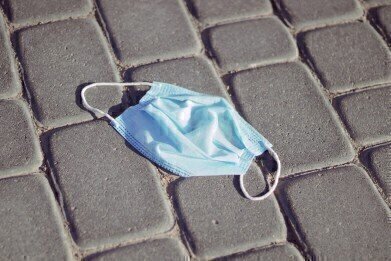Business News
How Has the Pandemic Affected Waste in 2020?
Dec 26 2020
The outbreak of COVID-19 has affected all facets of our lifestyles, all across the globe. But while the environmental implications of coronavirus have largely been confined to its impact on emissions in the mainstream media, the effect on our output of waste is perhaps a cause more deserving of the limelight.
That’s especially true with regard to our consumption and disposal of single-use plastics. The emphasis placed upon hygiene and sanitation as a means of preventing the spread of the virus has led to a massive increase in the use of face masks and gloves – many of which are not reusable or recyclable. That has led to a significant surge in the amount of plastic pollution being generated this year.
Alarming figures
In its exposé show War on Plastic, the BBC explored the extent of the UK’s infatuation with single-use plastics as a result of coronavirus. Their investigative team found that if everyone in the country used a single-use mask every day of 2021, it would lead to 128,000 tonnes of plastic waste.
With very few single-use items suitable for recycling, the majority of them end up in landfill, are sent overseas for processing or else are in incinerated, contributing harmful emissions to the atmosphere. In the worst-case scenarios, they are simply left to accumulate in the environment, where they eventually break down into much smaller microplastics. These can be devastating to marine life, while the long-term effects of exposure to airborne microplastics is still not fully understood.
A Cornish case study
The problem has infiltrated all parts of the country, including fairly remote communities such as one beach town in northern Cornwall. Here, 23-year-old environmentalist Emily Stevenson has launched her own socially minded business called Beach Guardian, performing regular walks on the area’s beach walks to clean up any pollution and document its existence.
Prior to the outbreak of the pandemic, Ms Stevenson had never found a single face mask. Now, she finds approximately five per week, while the prevalence of gloves is even more concerning. On average, Ms Stevenson and her team of volunteers pick up in excess of 100 gloves with every excursion. To date, they have collected over 270 face masks and almost 1,000 gloves.
Practicing sustainability
How can this terrible trend be reversed? The solution is simple – people must begin to prioritise the sustainability of reusable personal protective equipment (PPE) over the convenience of disposable alternatives. Unchecked, it’s thought that the human race will consume 129 billion face masks and 65 billion gloves each month, generating an incredible amount of plastic waste in the process.
“Yes, it has gotten into the environment, but we can also turn it around just as quickly as it has become a problem because the awareness is there,” explained Ms Stevenson. “Everybody is talking about it… I think it is a credit to how far we have all come.” We may have come a long way, but there’s an even greater distance still to go if we are going to win this war on plastic, once and for all.
Digital Edition
AET 28.2 April/May 2024
May 2024
Business News - Teledyne Marine expands with the acquisition of Valeport - Signal partners with gas analysis experts in Korea Air Monitoring - Continuous Fine Particulate Emission Monitor...
View all digital editions
Events
Jul 30 2024 Jakarta, Indonesia
China Energy Summit & Exhibition
Jul 31 2024 Beijing, China
2024 Beijing International Coal & Mining Exhibition
Aug 07 2024 Beijing, China
IWA World Water Congress & Exhibition
Aug 11 2024 Toronto, Canada
Aug 25 2024 Stockholm, Sweden and online










.jpg)








